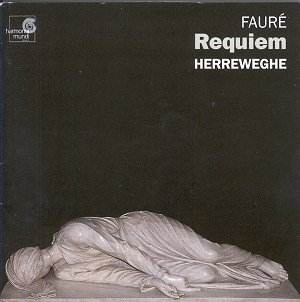Herreweghe has recorded the Requiem before. Thirteen
years ago he gave the "Madeleine version", the chamber arrangement,
which caused something of a stir at the time. The new recording is the
familiar "concert version", the full score. He employs period
instruments, a "loud harmonium" as sanctioned by Fauré
when an organ was unavailable and most importantly the use of Gallic
pronunciation of Latin. The distinguished Fauré scholar Jean-Michel
Nectoux notes that this is an attempt to approach the verbal
sound heard in Fauré’s day (a sound now much changed) whilst
acknowledging that it represents only one of several approaches of interpretation.
The lack of prescriptive judgement is entirely laudable and interestingly
the performers used a 1930 recording of the work – conducted by Gustave
Bret – as a benchmark for the prevailing Parisian Latin pronunciation.
There are many things in the recording that I found
attractive; the mellowness of the gut strings, the harmonium interjections,
the choral precision and warmth. Herreweghe’s sympathetic conducting
has frequent radiance. But isn’t the opening Introit and Kyrie simply
marmoreal at this tempo? There is something congealed about the music
at this speed, an inertia that weights the music too heavily in one
direction. I suspect Herreweghe was trying to underscore the music’s
journey from introspection to the acceptance of the concluding In paradisum
but it sounds unconvincing. I liked the clarity and the veiled quality
of the strings in the Offertoire, the lightening of the texture at In
excelsis in the Sanctus – a very acute piece of choral conducting.
As for the solo singers Stephan Genz has a pleasantly warm baritone.
Johannette Zomer gives full weight to the pronunciation of the J
in Jesu. She has an intrinsically beautiful voice and sure dramatic
sense and is impressively equipped in all but one respect. She has –
and consistently employs – what I can only call a terminal vibrato;
phrase endings are repeatedly compromised by a vibrato that widens and
oscillates wildly. Elsewhere Herreweghe moulds his forces affectionately,
too much so really in Libera me where his tendency to Elysian languor
gets the better of him. Pastel hued violins end the piece and an attractive
performance but not a comprehensively convincing or successful one.
Harmonia Mundi doesn’t even advertise the existence
of the Franck Symphony on their CD cover so concentrated are they on
the Requiem. I liked Herreweghe’s restraint; it’s good once in a while
to exercise some aural diplomacy in the work but it pulls too many punches
in the end to be more than passingly attractive.
Jonathan Woolf


![]() See
what else is on offer
See
what else is on offer 